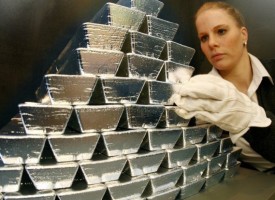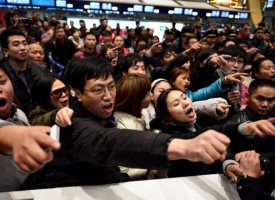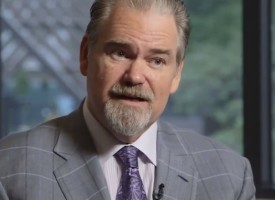As winter winds down and we move toward spring, what is happening around the world is stunning, particularly in China.
China Resetting
March 5 (King World News) – Here is the latest from Peter Boockvar as the world awaits the next round of monetary madness: China continued on the path of resetting its state set economic growth rate and to this time towards a range of 6-6.5%, the lowest in 30 years and vs 6.6% growth seen in 2018. You can be sure that right now actual growth is slower than that so focus on the trajectory. In order to cushion the slowdown, they are relying on fiscal stimulus via tax cuts (which could total about $300b), with yesterday announcing a cut to its VAT for manufacturers. They are also relying on the old standby of infrastructure spending via local government financing and is focused on targeting loan growth to small and medium sized businesses.
At the National People’s Congress, Premier Li said:
“The environment facing China’s development this year is more complicated and more severe. There will be more risks and challenges that are either predictable or unpredictable and we must be fully prepared for a tough battle.”
Li also threw a bone to those of us that want to see more market forces driving growth instead of from the power of the state. He said they would reduce red tape in doing business so companies can “spend more time doing business and less time chasing approvals.”…
BONUS INTERVIEW:
To listen to Doug Casey’s just-released KWN interview discussing his prediction of financial and economic chaos and a panic into gold CLICK HERE OR BELOW:
An Enormous Amount Of Bad Debt In China
Bottom line, China continues to balance the need and desire for growth at the same time an enormous amount of debt has been accumulated over the past 10 years that must be dealt with at the same time more debt is being taken on to stimulate the growth desired. Hopes that all this will work to cushion the growth moderation sent the Shanghai comp up another .9% which brings its year to date performance to 22%. The H share index though is unchanged. Copper is up by 1.3% but the Aussie$ and ASX traded lower (see why below). The offshore yuan is up a touch while the German DAX is down (China is its largest trading partner).
I’ll add this, until an enormous amount of bad debt in China is dealt with via write downs and payoffs, there will be a lot of economic running up hill. Thus, the more bankruptcies we read about, the more it seems they are doing something about it, however painful in the short term that would be. To the balancing act, there is an article today on China Daily.com titled ‘PBOC: Structural deleveraging and economic growth to go hand in hand.’ In a credit dependent economy, good luck with that but they will certainly try.
Data wise, China’s private sector weighted Caixin services index for February weakened to 51.1 from 53.6 in January and that was below the estimate of 53.5. Markit said “service providers signaled the least marked expansion of new orders since last October amid some reports of relatively muted demand conditions.” Backlogs fell to the lowest since September 2015.

Australia
Speaking of Australia, the China economic proxy that it is, its February manufacturing and services composite index fell to 49.1 from the first read of 49.7. Keep in mind, it’s been 29 years the last time Australia experienced a recession. With its housing market now buckling, odds are only going up that its streak will soon end. It’s this data point that is why the Aussie$ and ASX index didn’t respond to the China news. The RBA kept rates unchanged as expected and said “the main domestic uncertainty continues to be the strength of household consumption in the context of weak growth in household income and falling housing prices in some cities.” At 1.5%, their benchmark rate remains at a record low and the RBA is another central bank that is completely stuck. Does anyone think cutting rates from here would matter and arrest a slowdown and the unwinding of its housing bubble?
Japan
Japan did report a slight improvement in its services PMI for February as this index rose .7 pts to 52.3. “New business rose at the sharpest rate in almost 6 years in February” according to Markit. This is another example of how the domestic service side globally is outpacing the industrial/manufacturing/trade dependent side.
Lastly in Asia, Hong Kong’s PMI rose a touch to 48.4 from 48.2 but marks the 11th month in a row below 50. Singapore’s PMI slipped below 50 at 49.8 from 50.1. That’s the weakest since September. India’s services index was up slightly to 52.5 from 52.2.
Europe
Shifting to Europe, the Eurozone services PMI was revised .5 pt better than before at 52.8. No change was expected. Combining with manufacturing brings its composite index to 51.9. This is up from 51 in January and follows 5 months of m/o/m declines. Markit attributed the bounce to “the further easing of one off dampening factors such as the yellow vest protests in France and new auto sector emissions rules. However, the survey remained subdued as other headwinds continued to increasingly constrain business activity. These include slowing global economic growth, rising geopolitical concerns, trade wars, Brexit and tightening financial conditions.” The euro is little changed while bund yields are ticking higher.
With yields, ahead of the ECB meeting on Thursday, the German 2 yr bund yield is quietly 1 bp away from being the least negative since May 2016. Is it sniffing out a Draghi comment in two days on the fate of NIRP? About $11 Trillion of negative yielding securities are watching closely, let alone the entire world’s bond markets.

Meanwhile, Brexit Drama Needs To End
Finally, the UK services PMI for February did increase to 51.3 from 50.1 and that was better than the feared break below 50 at 49.9. The caveat though is the Employment component fell to the lowest since November 2011. And, “Business optimism about the year ahead has sunk to the lowest ever recorded by the survey with the exceptions of the height of the global financial crisis and July 2016. Brexit concerns dominate the list of reasons cited by companies for deteriorating business performance by a wide margin.” The pound is little changed in response but this Brexit drama needs to end already.
***KWN has released the powerful audio interview with Dr. Stephen Leeb and you can listen to it by CLICKING HERE OR ON THE IMAGE BELOW.
***Also just released: Fascinating Email About The Gold Market CLICK HERE TO READ.
© 2019 by King World News®. All Rights Reserved. This material may not be published, broadcast, rewritten, or redistributed. However, linking directly to the articles is permitted and encouraged.








